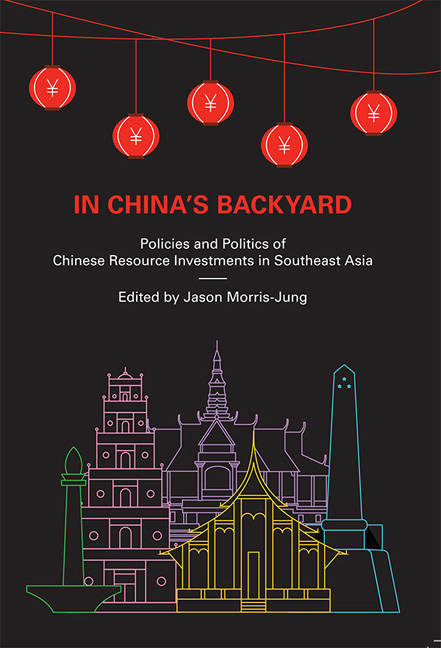Book contents
- Frontmatter
- Contents
- Foreword
- Acknowledgements
- About the Contributors
- 1 Introduction
- 2 Mixed Motivations, Mixed Blessings: Strategies and Motivations for Chinese Energy and Mineral Investments in Southeast Asia
- 3 Mineral Resources in China's “Periphery” Diplomacy
- 4 Energy Entanglement: New Directions for the China–Indonesia Coal Relationship
- 5 Indonesia–China Energy and Mineral Ties: The Rise and Fall of Resource Nationalism?
- 6 The Direction, Patterns, and Practices of Chinese Investments in Philippine Mining
- 7 Development Cooperation with Chinese Characteristics: Opium Replacement and Chinese Rubber Investments in Northern Laos
- 8 The High Cost of Effective Sovereignty: Chinese Resource Access in Cambodia
- 9 Complex Contestation of Chinese Energy and Resource Investments in Myanmar
- 10 Anti-Chinese Protest in Vietnam: Complex Conjunctures of Resource Governance, Geopolitics and State–Society Deadlock
- 11 Complexities of Chinese Involvement in Mining in the Philippines
- 12 Conclusion
- Bibliography
- Index
10 - Anti-Chinese Protest in Vietnam: Complex Conjunctures of Resource Governance, Geopolitics and State–Society Deadlock
Published online by Cambridge University Press: 04 July 2018
- Frontmatter
- Contents
- Foreword
- Acknowledgements
- About the Contributors
- 1 Introduction
- 2 Mixed Motivations, Mixed Blessings: Strategies and Motivations for Chinese Energy and Mineral Investments in Southeast Asia
- 3 Mineral Resources in China's “Periphery” Diplomacy
- 4 Energy Entanglement: New Directions for the China–Indonesia Coal Relationship
- 5 Indonesia–China Energy and Mineral Ties: The Rise and Fall of Resource Nationalism?
- 6 The Direction, Patterns, and Practices of Chinese Investments in Philippine Mining
- 7 Development Cooperation with Chinese Characteristics: Opium Replacement and Chinese Rubber Investments in Northern Laos
- 8 The High Cost of Effective Sovereignty: Chinese Resource Access in Cambodia
- 9 Complex Contestation of Chinese Energy and Resource Investments in Myanmar
- 10 Anti-Chinese Protest in Vietnam: Complex Conjunctures of Resource Governance, Geopolitics and State–Society Deadlock
- 11 Complexities of Chinese Involvement in Mining in the Philippines
- 12 Conclusion
- Bibliography
- Index
Summary
Since the turn of the millennium, Chinese economic activity in Vietnamhas been growing in scale, diversity and geographical coverage. Anincreasingly important area of this growing activity has been in naturalresource and energy sector projects. More recently, they have also been asource of public discussion and controversy, generating some of the mostspectacular incidents of domestic protest in the post-war era. However,as this chapter argues, to view these incidents simply as historicalanimosity towards China misses a lot. Rather, they reflect complexconjunctures of multi-level governance problems and contextual factors,among them Vietnam's on-going geopolitical tensions with China in theSouth China Sea. This chapter examines recent trends and public concernsemerging around China's growing economic activity in Vietnam, andthen explores in more detail two case studies of popular resistance to largeresource sector projects with Chinese involvement, namely a controversyover bauxite mining in the late 2000s and attacks on Chinese workers at amassive steel factory in Central Vietnam in 2014.
Introduction
Since market reforms in the 1980s, foreign investment has been and continues to be a driving force for Vietnam's economic development. Since normalization of bilateral relations in 1991, Chinese economic investments in Vietnam have increased dramatically. More recently, they have also shown a growing interest in Vietnam's rich mineral and energy resources. Geographical proximity makes Vietnam particularly interesting to Chinese resource companies, especially for minerals that have high transportation costs. Furthermore, shared histories, cultures and socio-political organizations have facilitated trade and business relations between these two nations.
On the surface of it, Chinese demand for natural resources and Vietnam's need for foreign investment is a perfect match. Yet one does not have to dig very deep below the surface to find a much more problematic situation. Recently, the General Director of the Department of Geology and Minerals of Vietnam publicly complained that up to 60 per cent of mineral licenses in northern Vietnam showed “Chinese traces”. It was as if, he suggested, “the Chinese were standing behind our back and controlling our own mining industry”. While the widespread opposition towards Chinese involvement in bauxite mining in the late 2000s was perhaps a first signal of unrest, the riots that targeted mainland Chinese workers at a Taiwanese-owned steel factory in Central Vietnam in 2014 demonstrated just how grave the matter can become.
- Type
- Chapter
- Information
- In China's BackyardPolicies and Politics of Chinese Resource Investments in Southeast Asia, pp. 229 - 255Publisher: ISEAS–Yusof Ishak InstitutePrint publication year: 2017



